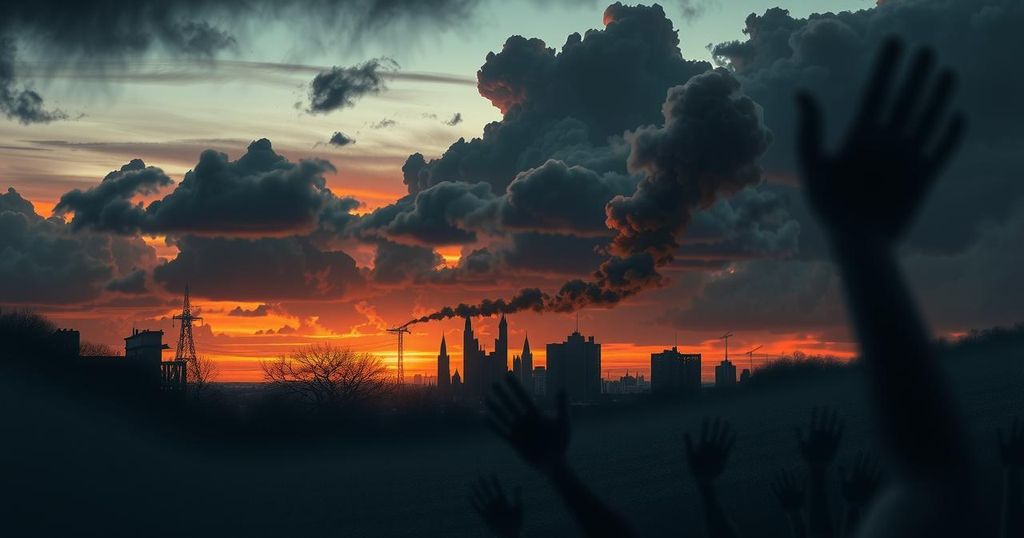Rebels from the March 23 Movement (M23) have captured Goma in eastern DRC, escalating an ongoing conflict that has resulted in over 770 deaths. This takeover threatens regional stability, exacerbates humanitarian crises, and heightens tensions with Rwanda. The M23, supported by Rwanda, has significant control over valuable resources in North Kivu, prompting fears of a broader conflict in the DRC.
In a significant escalation of the conflict in the eastern Democratic Republic of the Congo (DRC), the March 23 Movement (M23) has taken control of Goma, the capital of North Kivu province. Since the M23 claimed victory on January 27, at least 773 lives have been lost, with several towns such as Sake and Minova also falling under rebel control. The rebels are reportedly advancing towards Bukavu, the capital of South Kivu, and have expressed intentions to march toward Kinshasa, the DRC’s capital, though such a move seems improbable given the distance from Goma.
The speed of the M23’s advance was unexpected, with them capturing Goma in a mere three days. The roots of this conflict trace back to ethnic divisions established during the Rwandan genocide in 1994. The M23 emerged in 2012, positioning itself as a defensive force for Congolese Tutsis against perceived discrimination and threats from groups like the Democratic Forces for the Liberation of Rwanda, which has a history of severe violence in the region.
The takeover of Goma holds substantial importance. It places a strategically vital province in the hands of the rebels. North Kivu is rich in resources, including coltan, essential for several industries. The M23’s control over mining towns, including Rubaya, which produces 15% of the world’s coltan, has facilitated lucrative income for the group, with the Global Initiative against Transnational Organized Crime suggesting that armed groups are motivated by profit.
Additionally, the capture has intensified tensions between the DRC and Rwanda, raising fears of an inter-state conflict. Following the capture of Goma, the DRC’s foreign minister accused Rwanda of invading Congolese territory. Past UN reports have established that Rwanda has provided support and command to the M23, a claim Rwanda has consistently denied despite evidence.
The unfolding conflict is likely to exacerbate a severe humanitarian crisis in the region. As of March 2024, internal displacement in DRC has reached 7.2 million, one of the gravest situations globally, with over six million facing significant food insecurity in the eastern provinces. This situation underscores the critical needs of the civilian population amid ongoing violence.
Historically, the DRC and Rwanda have engaged in two previous wars, initiated by Rwanda’s incursions to eliminate threats from anti-Rwandan groups within DRC. The outcomes of these conflicts resulted in the loss of approximately 6 million lives. While diplomatic interventions have yielded temporary ceasefires in the past, the prevailing circumstances and recent territorial losses complicate peace negotiations.
To date, the DRC government, led by President Félix Tshisekedi, has been hesitant to enter into peace talks until territorial losses are addressed. The involvement of Western powers could be influential in curbing the M23 insurgency, similar to past foreign aid cuts that impacted Rwanda’s rebel support. Furthermore, the European Union is being urged to reconsider its minerals deal with Rwanda to mitigate the situation.
Ultimately, mere ceasefires will fall short of achieving lasting peace. A comprehensive and sustainable resolution addressing the underlying causes of conflict is imperative for the DRC to secure a stable and peaceful future, and to restore order in the affected regions.
The situation in the eastern Democratic Republic of the Congo has been volatile for years, primarily due to ethnic strife stemming from the Rwandan genocide in the 1990s. The M23 rebel group claims to represent the interests of Congolese Tutsis who face discrimination, and the conflict has further evolved with internal and external factors complicating the dynamics. The region is also critical due to its rich mineral resources, contributing to the conflict’s profitability for armed groups. The involvement of Rwanda is a pivotal factor in this situation, as they have been accused of supporting M23. The humanitarian crisis is another pressing issue, with millions displaced and suffering from food insecurity as a direct result of the ongoing violence and instability in the region.
The capture of Goma by M23 marks a critical turning point in the conflict in eastern DRC, intensifying humanitarian issues and escalating tensions with Rwanda. While past international interventions have led to temporary ceasefires, there is an urgent need for a comprehensive resolution that addresses the root causes of this violence. Strengthening diplomatic efforts, coupled with constraints on external support to armed groups, may offer the best hope for restoring stability in the region.
Original Source: theconversation.com




